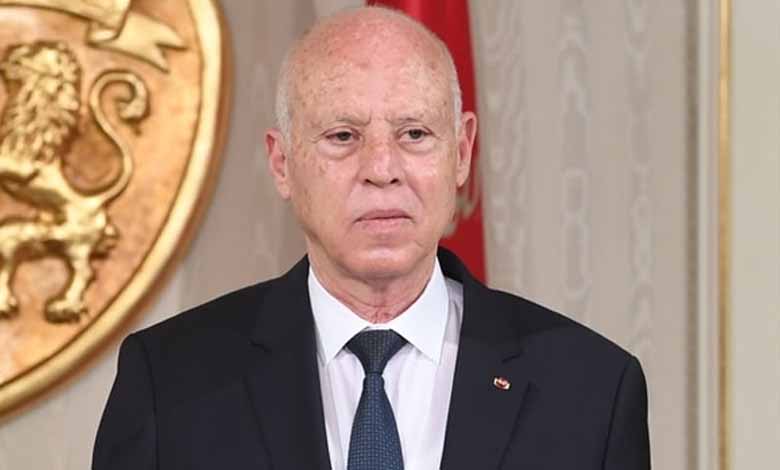Kais Saied accuses colonial circles of preparing for new settlements

The Tunisian President reaffirms that his country is not a furnished apartment for sale or rent, noting that African migrants seek stability in Tunisia contrary to popular belief.
Tunisian President Kais Saied emphasized that the security forces in his country protect irregular migrants from Sub-Saharan Africa, emphasizing that Tunisia is “not a furnished apartment for sale or rent.” His statement came in response to criticism directed by human rights organizations at the Tunisian authorities, accusing them of “racism” and “violence” against African migrants and their expulsion following clashes that erupted in the province of Sfax following the death of a Tunisian youth.
The Tunisian presidency stated that during the meeting between Saied and Prime Minister Najla Bouden on Saturday, they discussed “the issue of irregular migration and the humanitarian treatment received by migrants, which stems from our values and principles, contrary to what is promoted by colonial circles and their accomplices, who only serve these circles’ interests.”
Saied stated, “The positions of these circles are the same as the rabid propaganda abroad that paves the way for a new kind of settlement and distorts the facts and spreads lies,” emphasizing that “the Tunisian security forces have protected those who have come to Tunisia and seek stability here, contrary to what is rumored… These plans are exposed and well-known for a short time.”
He confirmed that “Tunisia is not a furnished apartment for sale or rent, and these migrants, who are displaced, have only chosen Tunisia because the way has been paved for them by criminal networks that target countries and people.”
During a meeting with Interior Minister Kamal Al-Fakhfakh and security officials on Tuesday, Saied stated that “criminal networks” are responsible for irregular migration operations to Sfax.
Sfax has been witnessing a significant influx of irregular migrants from sub-Saharan African countries in the hope of crossing the Mediterranean to Europe in search of a better life amid political and economic crises in their home countries.
The Tunisian police in the city gathered dozens of African migrants at the Sfax Exhibition Center before transferring them to a location near the Algerian and Libyan borders, following protests by hundreds of local residents following the death of one of the residents in clashes with illegal immigrants.
The human rights organization Human Rights Watch called on the Tunisian authorities to end what it described as “collective expulsions” of African migrants and their relocation to a remote desert area near the Libyan border.
In a statement, it said, “The Tunisian security forces collectively expelled hundreds of black African migrants and asylum seekers, including children and pregnant women, since July 2 to an isolated, remote, and military-controlled area on the Tunisian-Libyan border,” adding that “many individuals reported being subjected to violence by the authorities during their arrest or deportation.”
Sfax has recently witnessed demonstrations where banners calling for the deportation of Africans were raised, while protesters expressed their rejection of turning the area into a place for settling migrants.
President Kais Saied has always denied, during his meetings with European delegations visiting Tunisia recently to find a solution to curb the flow of migrants, that his country plays the role of guarding Europe’s borders or turning into a place for settling Africans.
The European Union seeks to sign a memorandum of understanding with Tunisia to assist it in its financial crisis, driven by fears of a financial collapse that could trigger waves of migration to Italy and other member states. However, Tunisia is still studying the agreement.
President Kais Saied refuses to succumb to any European pressure or bargaining that includes linking financial aid of around $900 million, which the Europeans intend to provide to Tunisia, with curbing the flow of migrants and settling Sub-Saharan Africans.
Italian Prime Minister Giorgia Meloni stated during her visit to Tunisia that “destabilizing Tunisia will have serious repercussions on the stability of all of North Africa, and these repercussions will also affect us.” She emphasized that her country’s position is based on “addressing the current situation in Tunisia in a practical manner.”
Deputy Prime Minister and Minister of Foreign Affairs and International Cooperation Antonio Tajani announced that Rome will host a “major governmental conference between African and European countries on the issue of migration” on July 23, according to the Italian news agency “AKI.”
During his meeting with Meloni, Saied called for the organization of a summit bringing together North African countries, countries of the Sahel, the Sahara, and North Mediterranean countries to address the causes of illegal migration, emphasizing that security solutions have proven to be ineffective in containing the phenomenon.












